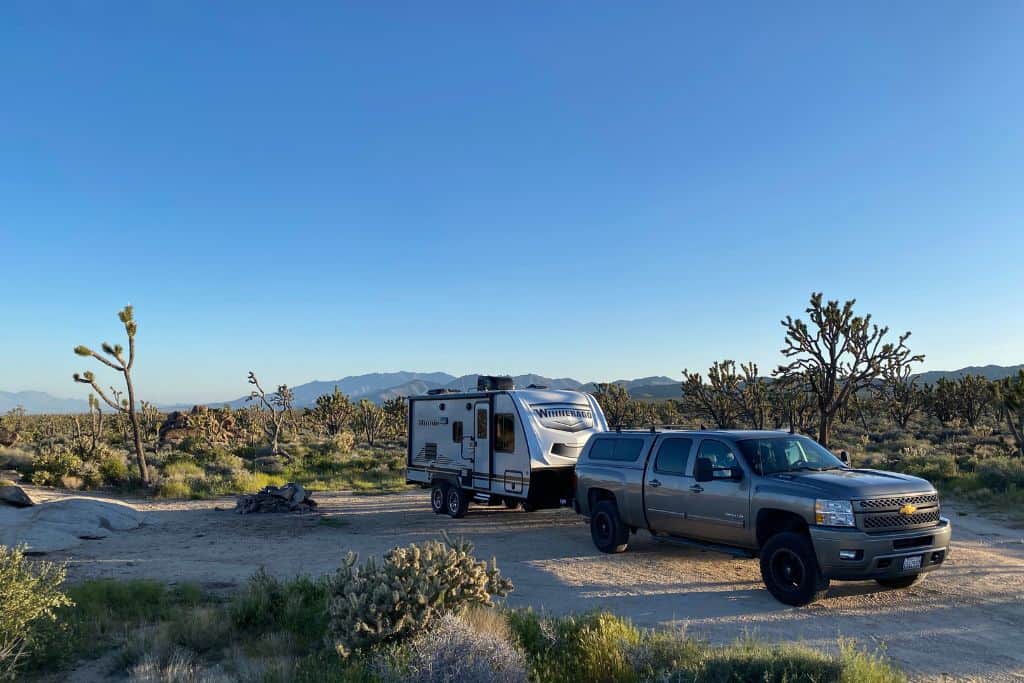Tent Camping Vs Trailer Camping: A Definitive Comparision
My family and I love camping. It is something I have done since I was a kid, and is now our family’s primary form of vacation (although we love travel of all sorts). We have tried just about every style of camping; tent, travel trailer, camper van, and tent cabin. While some were short-term trials (van, tent cabins), I’ve spent more nights in a tent than I can count, and I have owned two separate trailers.
Each has its individual pros and cons. In this article, I’m going to weigh the pros and cons of tent camping vs trailer camping. I’ll save the camper van, RV camping, and tent cabin comparisons for another time.
If you are reading this article I’m guessing you fit into one of two groups. Either you are new to camping and are trying to decide whether to try a tent first or jump straight to a trailer. Or you are already a tent camper and are considering moving to a trailer.
I have written this article with those two audiences in mind, though anyone interested in camping will find the information useful.
Is Tent Camping Better?
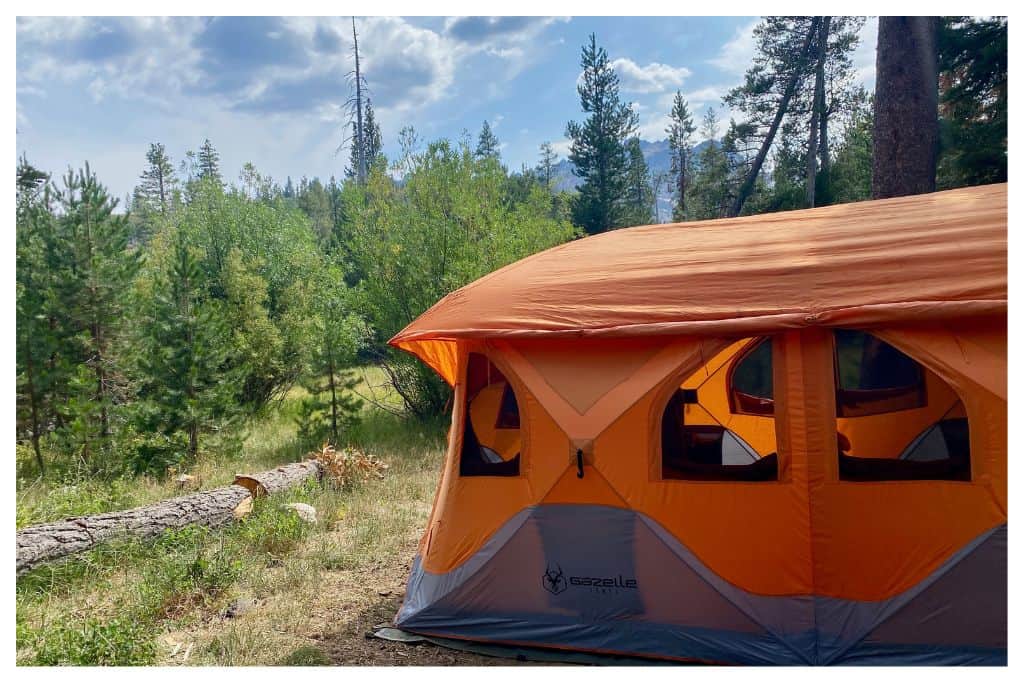
If you ask a purist, the answer will be yes, tent camping is the only true form of camping. Well, spoiler alert, I’m not a purist. In my opinion, whether tent camping is better than trailer camping depends on a variety of factors, including, your budget, the locations you visit, the camping experience you are looking for, the size of your family, and more.
Tent camping certainly has its advantages, which I will dive into later, but whether or not it is better than trailer camping, is strictly in the eyes of the beholder. The bottom line is that everyone has their own camping style, what’s right for one, may not be for another.
Is Camping In A Trailer Really Camping?
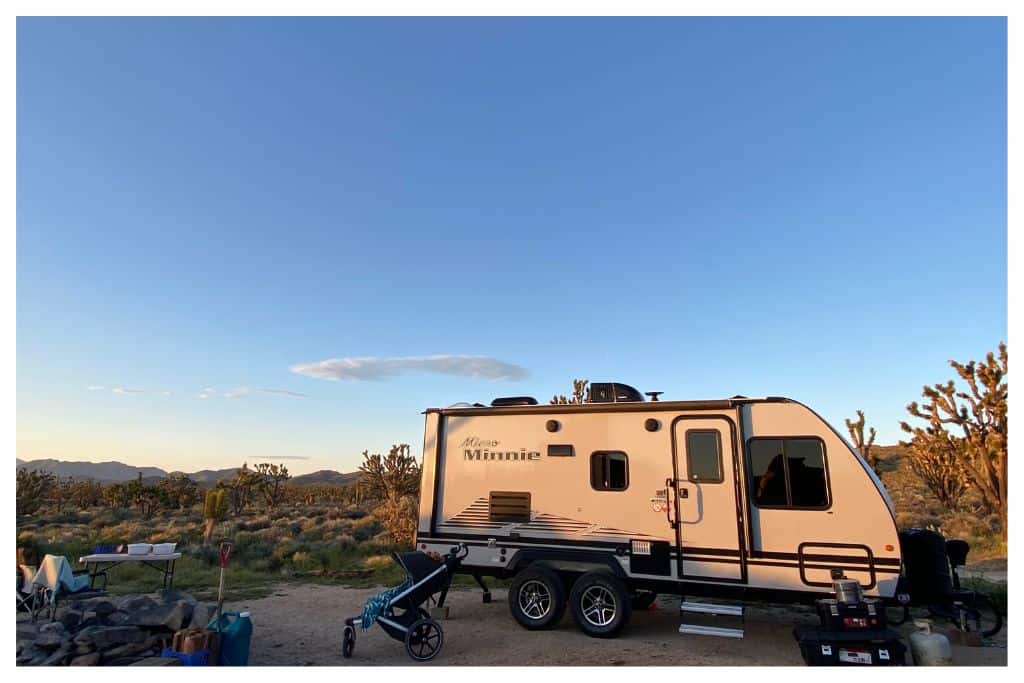
Okay, so some of you may be asking, ‘is trailer camping really even camping?’. Considering the size, and opulence, of some of the trailers that are available nowadays, honestly it’s a valid question. You can get trailers today that are 40 feet long, have multiple rooms, big screen TVs, fireplaces, and yes, even a bathtub.
Whether you want to call staying in a trailer like this a camping trip or not, one thing is for certain. It is in no way comparable to tent camping. These types of trailers are, for the most part, meant for, and limited to designated RV parks.
In this article, I’m really talking about smaller trailers, trailers that are capable of going to many, if not most, of the same places that you would want to go tent camping. Namely, places like national parks, state parks, and other similar locations.
So my answer is if you are going to the same places, and getting outdoors, then yes, trailer camping is definitely still camping!
Tent Camping Vs Trailer Camping: A Breakdown
I broke my comparison of tents and trailers into five categories; Cost, Ease of Set Up, Comfort, Dealing with Weather, and Cooking. I took an in-depth look at each of these and then addressed some additional advantages and drawbacks of both tents and trailers.
Keep in mind that there are many different kinds of both tents and travel trailers. There are large tents, small tents, lightweight tents for backpacking, tents with multiple rooms, and even hot tents (with wood-fired stoves). When it comes to trailers there are large hard-sided trailers, pop-up campers, tent trailers, teardrop trailers, and all sorts of additional options.
I’m going to speak about the general characteristics of tents vs trailers but of course, the specifics of any particular setup will vary.
Cost
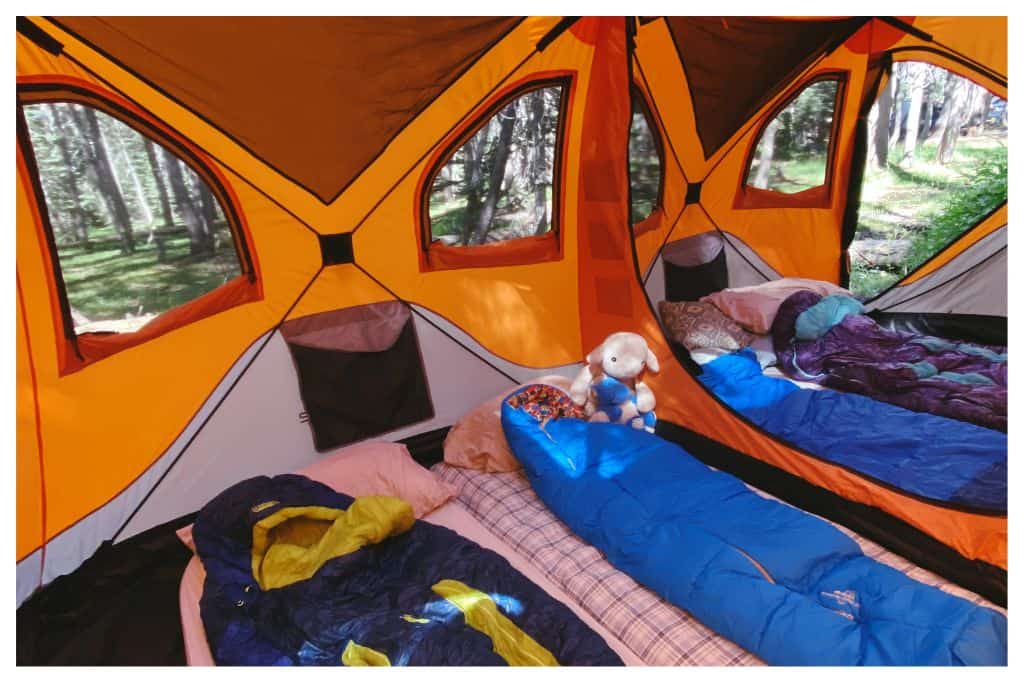
When it comes to cost, there is one clear winner, tent camping. A solid tent camping setup is going to be a fraction of the cost of even a cheaply priced trailer. To be clear, when considering the cost of a tent camping set up I have included the following items;
- Tent
- Sleeping Bags
- Air Mattress (Or other sleeping platforms)
- Campstove
- Ice Chest
- Lantern
Additional items such as camp chairs, pots and pans, etc…will be needed for trailer camping as well, so the cost evens out. Now there is no doubt you could geek out and drop a ton of dough on the newest, fanciest, top-of-the-line camping gear.
However, even a very quality setup, for a family of four, can be obtained for under $2,000. If you’re shopping on a budget you could easily keep it under $1,000.
In comparison, even the cheapest new trailer is going to cost you over $10,000, probably closer to $20,000. You can save some money going with a used trailer, however, you will want to really do your research if you go that route.
Trailers, all trailers, require a ton of maintenance, if you buy a used one that has been neglected you could be walking into a nightmare. That’s not to say it can’t be done, but if you choose to go the used route, make sure you take your time, inspect it closely, and ask lots of questions about maintenance.
If you are interested in a trailer but not yet ready to pull the trigger RV rentals are a great way to test the waters. There are a variety of sites, such as Outdoorsy or RV Share, that offer peer-to-peer trailer and RV rentals. Many of which will even deliver the trailer to your campsite if you are uncomfortable towing.
The Cost Winner: Tent Camping
Ease of Setting Up Camp
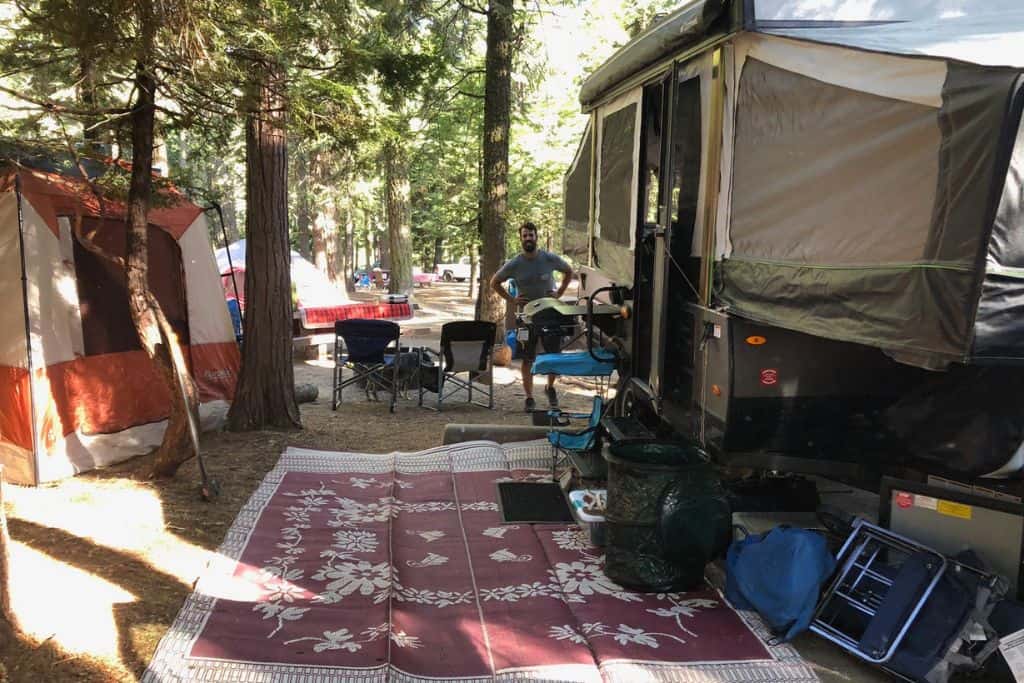
This category is actually a little closer than you might think. At first glance, it might seem that there is far less involved in getting your trailer set up in camp than the process of setting up a tent. However, there is often more involved with getting your trailer dialed in than you might think.
Parking your trailer isn’t always the easiest task. If you are planning to camp in RV parks that are designed for trailers and large RV’s then it is a pretty easy process to get your trailer parked and leveled. However, if you are planning on camping in places like state and national parks it can be a little more challenging.
Many of the state, national parks, and similar campgrounds weren’t built with trailers in mind. The roads are narrow, often lined with trees, and the parking spaces aren’t always designed to accommodate trailers, especially large ones. All that is to say that it can be a bit of a process to get your trailer parked on your site.
Once your trailer is parked, the process of getting it leveled and stabilized isn’t particularly complicated but does take a few extra minutes. As you get practice backing up your trailer it does become easier and quicker to get it parked, regardless of the challenges of your site.
On the flip side, when tent camping you get to pull right in and park. Then starts the process of setting up your tent, setting up your beds, moving your luggage into your tent, and unpacking the rest of your gear from your car.
Additionally, when tent camping you can pull into your site, and stretch your legs for a bit before diving into setting up. With trailers, you need to get it parked as soon as you arrive. This may seem trivial if you haven’t gone through the process before, but it is nice to have a few minutes to relax, especially after a long drive.
One advantage trailers have is that you can keep most of your camping gear stored away and you only have to pull it out when it is needed during your trip.
All that being said, I would still give trailers the slight edge when it comes to setting up camp. Once you are efficient at parking your trailer there is just less overall to do than if you have to set up your tent and bedding.
The Ease Of Setting Up Camp Winner: Trailer Camping
Comfort
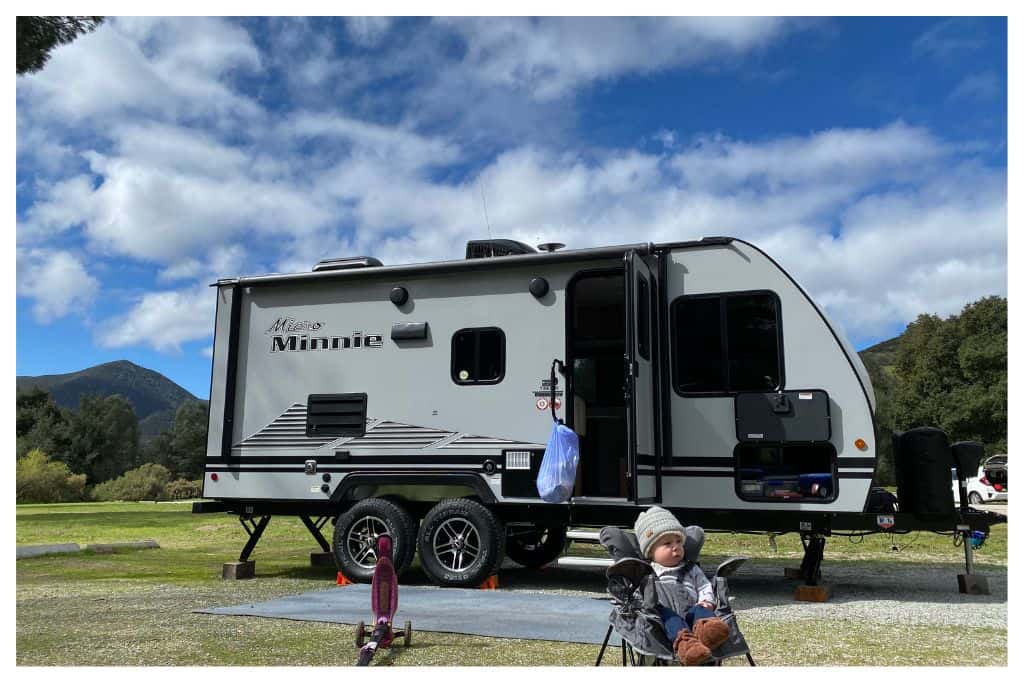
The comfort category is clearly won by trailers. Increasing comfort is the very reason most people buy trailers after all, so they better deliver!
There are a variety of advantages. First, trailers typically have a serious advantage when it comes to beds. Many trailers come with a queen-size actual mattress. Additionally, the beds are elevated, so easier to get in and out of, and you’re not going to have the problem of lumpy uneven ground disturbing your rest.
Second, pretty much all trailers have a heater so that you can keep it nice and toasty inside when camping in cold conditions. Most trailers also come with an air conditioner, however, these can only be used when hooked up to external electricity like a campsite outlet or a generator.
Third, most all trailers have an internal bathroom and water heater, which means, hot showers! I have to admit that prior to owning my first trailer I was one of those people that thought hot showers while camping were overkill. However, once I had that experience of taking a hot shower after a day of hiking and climbing into bed clean I understood exactly what trailer owners were raving about!
The internal bathroom on trailers is another great luxury. Some campgrounds have nicer bathrooms than others, but my wife and daughter especially loved the internal bathroom when the only other option was a smelly pit toilet. An unexpected bonus of having the internal bathroom was using the bathroom while on drives. No more dirty gas station bathrooms!
In defense of tents, camping equipment is getting more and more comfortable. Tents are more spacious and easier to set up than ever before. Sleeping pads are far superior to what they were even 10 years ago. And with the right sleeping bag, you can stay warm in any condition. You can even get portable water heaters and shower tents to allow you to have a hot shower!
Comfort Winner: Trailer Camping
Dealing with Weather
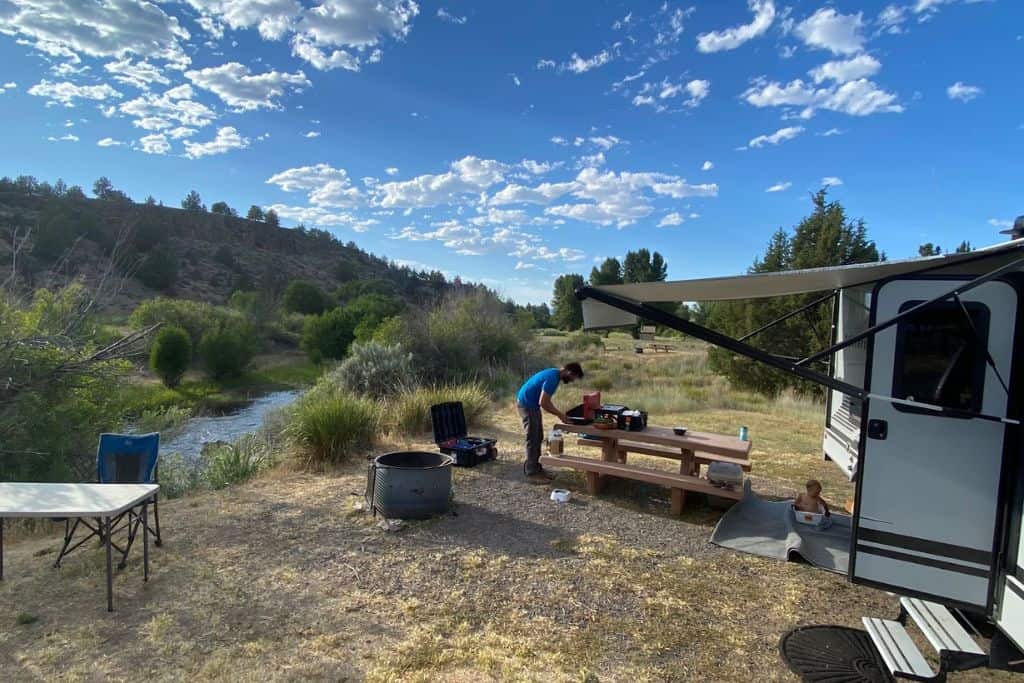
While we all hope for perfectly warm and sunny days while camping the undeniable truth is that if you camp enough inclement weather is inevitable. So, if you are going to go camping, you need to at least be prepared for the possibility of bad weather. In this regard, trailers are once again going to take the edge.
Weather conditions can heavily influence your camping trip. Trailers offer climate control, they will be dry when it rains, warm when it’s cold, can be made cool in the heat, and will protect you from the wind. Additionally, most trailers will come with an easily deployable awning which will give you dry space to peel off wet clothes before walking inside.
Most tents these days will do a pretty solid job of keeping you dry inside, when utilizing the rain fly, in all but the most serious of rain storms. If you have a small tent, you likely won’t have a place to take off wet clothes before climbing into your main sleeping area. However, if you go with a large tent, you can find options that have a changing room, or entry area, that is covered and waterproof but separated from the main sleeping area.
When it comes to the cold a good sleeping bag will keep you warm at night no matter how cold it is outside, and you can even get tent heaters. We have one that is designed for indoor use and would heat the tent beyond the point of comfort if we turned it to max.
There are some options for cooling tents but none of them are particularly practical. And when it comes to serious wind tents are not the optimal choice. With light winds tents are fine, but after a certain point tents will either collapse, rip, or just become so loud in a heavy wind that it’s impossible to sleep.
Dealing With Bad Weather Winner: Trailer Camping
Cooking
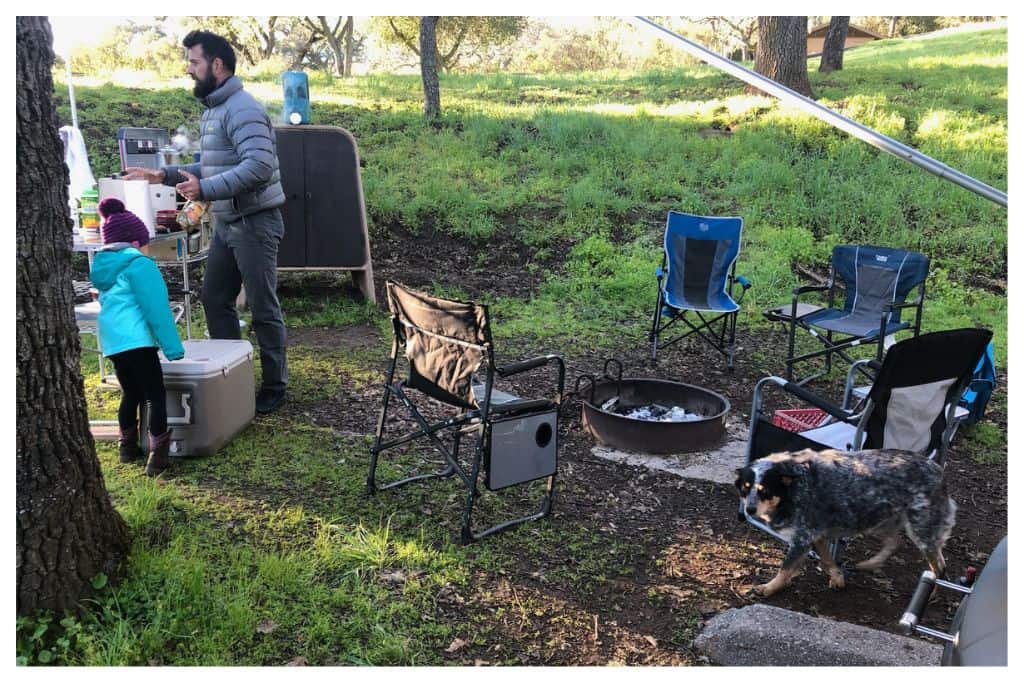
Considering that when camping you will be preparing all of your meals yourself the time you spend cooking and preparing meals will constitute a significant portion of your vacation. Especially if you have a large family. For this reason, your camp kitchen is an important consideration.
Trailers do have some advantages when it comes to cooking. The biggest I would say is the refrigerator. Most trailers these days come with a refrigerator plenty large to store all the cold food you would need for a week.
Additionally, you will have a sink plumbed with hot and cold water. Many trailers also have a small oven for baking and most will have a microwave that can be used when plugged into external power.
The downside is that most trailers, other than the behemoths, have very little preparation space. Some may have a small counter, but they aren’t at all practical for cooking a meal for a family.
The largest downside is that you are stuck inside while cooking. When everyone else is outdoors enjoying the fresh air or sitting by the fire, you are stuck inside only looking at the fun through a small window.
Kitchen equipment for tent camping these days is pretty great. My camp stove boils water significantly faster than my stove at home. We have a custom kitchen box that my Dad built years ago, but there are also many off-the-shelf camping kitchen organizers.
Ice chests have come a long way, and you can even get an electric ice chest that will run off your car battery and keep your food at the perfect temp (they are a bit pricey). Want hot water on tap? There are portable water heaters that will give you just that.
Most importantly, you are outdoors while cooking. I prefer the outdoor cooking experience so much that even when we had a trailer I still set up my outdoor kitchen and did all my cooking out there. Making the interior trailer kitchen almost useless.
Cooking Winner: Tent Camping
Round Up

Based simply on this five-point scoring system trailers would win by a score of 3 to 2. However, these aren’t by any means all of the factors to consider. Just the ones that are easiest to directly compare.
Next, I will dive into the additional advantages and drawbacks of both tent and trailer camping.
Additional Advantages and Drawbacks to Tent Camping
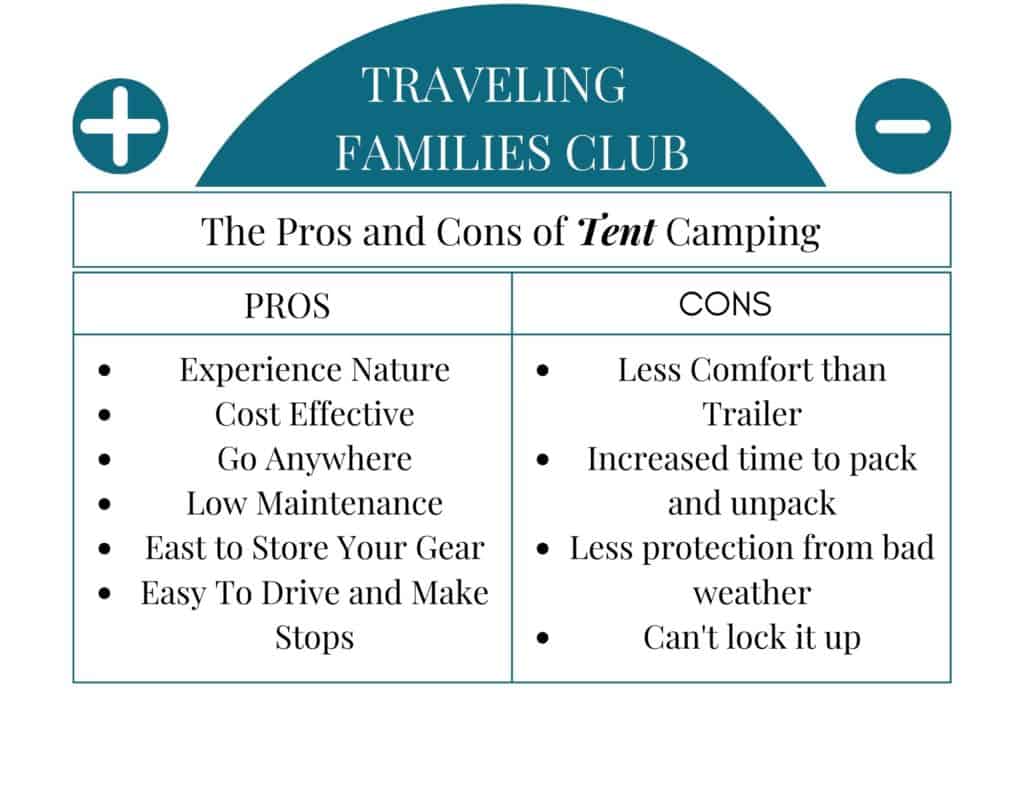
✔️ Easy to Store Your Gear
A simple tent camping setup won’t take up much space. Obviously, no more storage space than you have in your car. So finding a place to store it all when you get home isn’t much of a challenge for most people.
✔️ Easy To Maintain
Most quality tent camping gear will last decades with little to no maintenance. You may have to clean your stove from time to time or open up your tent when you get home to let it dry out if it was wet when you packed up. Aside from that, you pack it away once you’re home and it’s ready to go when you need it.
✔️ Go More Places
With tent camping, you will have fewer limitations on where you can camp. This will open up options for the type of camping that you can do. Not only are certain areas simply inaccessible to trailers or RVs, but certain campgrounds outright forbid them.
Additionally, many campgrounds that do allow trailers may only have a limited number of sites with parking spaces big enough to accommodate trailers, especially large ones.
✔️ Easy To Drive and Make Stops While Driving
One of our favorite things to do when going camping is checking out the towns we drive through on the way to and from our campsite. We found that when we had a trailer it was much more difficult to find parking, in some cases causing us to completely skip a town we would have loved to explore. Many parking lots in small towns simply aren’t designed to accommodate a car and trailer combo.
✔️ Experience The Elements
Perhaps the biggest benefit to tent camping is that you are forced, in a good way, to interact more with nature. When laying in your tent you will hear the birds in the morning, perhaps the wind blowing through the trees, or the water of a nearby river. All of this is lost when sleeping in a trailer.
Sleeping in a tent also just feels more unique. For all of the comforts that a trailer provides it sort of feels like sleeping in a cheap apartment on wheels.
If you go with tent campers or pop-ups, you can gain back some of the experience of being in nature while also having many of the conveniences provided by trailers.
Drawbacks of Tent Camping
❌ Increased Time To Pack and Unpack
Above I mentioned that trailers have an edge when it comes to the time it takes to set up camp. They also have a significant edge when it comes to packing and unpacking at home. With trailers, you can simply leave most of your camping gear packed away. When it is time to go, pack your clothes and load up on fresh food and you are ready to head out.
Packing your car with all your tent camping gear can be a bit of a game of Tetris. I like to think I have the process pretty dialed in but it still takes me a couple of hours at a minimum to get all packed and ready to leave.
Then it is at least another hour or two to unpack all the gear and store it away when I get home.
❌ Some Limitations In Bear Country
In some areas with high bear activity tent camping is prohibited during certain times of the year. I have only personally seen this in certain areas of Glacier and Yellowstone National Park, but have heard there are other areas with similar restrictions.
While these restrictions are relatively few and far between it is worth noting if your desired destinations all have heavy bear activity. While most wild animals won’t bother a tent in any way, some people are going to simply feel more comfortable with the walls of a trailer separating them from the creatures of the forest.
❌ Can’t Lock It
There is no practical way to lock a tent. Anyone with a pocket knife could simply cut a hole in the side. So you can’t leave any valuables in your tent. I have never personally had this be an issue, but for folks who are extra security conscious having a hard-sided trailer with a door you can lock may give you peace of mind.
Additional Advantages and Drawbacks to Trailer Camping
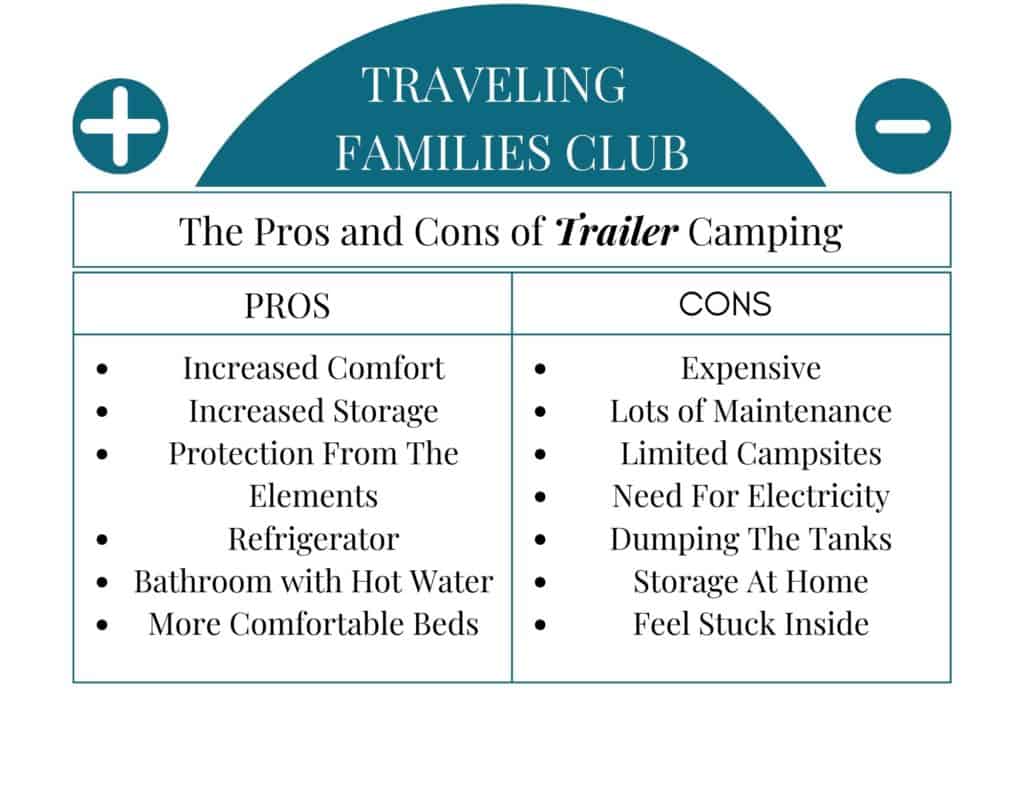
✔️ More Storage Space
Having a trailer dramatically increases your storage space and allows you to bring a lot more luxuries on your trip. Whether it is extra toys for your kids or luxuries for you, you’ll have more room to bring it, whatever ‘it’ is.
✔️ Better Access to Food and Gear Underway
A great thing about trailers is that, for the most part, you can easily access your food and gear without much work. When we had a trailer it was super nice to be able to pull over in a scenic spot and put together a picnic lunch without having to unpack anything other than what we were using.
Even a well-organized pack job for tent camping will likely require you to pull out a few things to be able to access all you would need to make a picnic lunch, or at the very least, it would be more work than if you had a trailer.
✔️ Eliminate Unwanted Noises
I mentioned above that an advantage to tent camping is that you still get to hear the sounds of nature. The flip side to that is you will also hear all the sounds of a campground.
You may want to go camping for some peace and quiet, but you may end up next to a family reunion that wants to get drunk by the campfire and sing kumbaya until someone forces them to stop.
If you don’t want to be that guy in your underwear yelling ‘keep it down over there’ then a trailer might be good for you.
Drawbacks to having a trailer
❌ Maintenance
Trailers require maintenance. A lot of maintenance. Consider for a moment that a trailer is essentially a hosue on wheels bouncing down the road. Even a well-built house would have things rattle loose.
Then consider that most trailer interiors are built out of wood that is hardly more stable than cardboard held together with staples that are thinner and more flimsy than the ones that are in the stapler on your desk. And you have a recipe for constant maintenance.
I won’t even get started on all the issues that we dealt with on the two trailers that we owned, but just know going into it that a trailer requires a lot of maintenance. Don’t ever let anyone tell you otherwise.
If you are seriously looking into a trailer the best advice I could give is to find a Facebook group for owners of whatever your preferred brand of trailer is (there are groups for every major brand and most small ones) and follow the posts for a couple of months to get an idea for what the common issues are.
❌ Dumping The Black Water Tanks
While you may get used to it, dumping the black water tanks certainly isn’t the part of camping you look forward to. Mechanically speaking it is a relatively easy process.
However, what they don’t tell you at the dealership is that it isn’t always easy to find a dump site. Not all campgrounds have them. Even those that do, may only have one or two for the entire campground. Meaning that if you are leaving on a weekend you may have to sit in line, while everyone else pours their week’s worth of poop down a pipe waiting for your turn to do the same. Not the best way to start off a long drive home.
Additionally, it’s just an extra thing to manage when you are supposed to be relaxing on vacation. Wondering if the poop tank is full isn’t the thing I want occupying my mind when I’m trying to relax in nature.
❌ Need For Electricity
Just about all of the features that make a trailer desirable require electricity to function. The lights, the heater, the water pump, and most likely the fridge. All trailers will come with a battery standard, however, the stock battery setup will typically only power the trailer for a day or two.
This means for any trip longer than that you will either have to camp in a campground with an electrical hookup or invest in some sort of charging system for your trailer. There are solar systems that can keep you charged when it’s sunny or gas-powered generators.
❌ Storage When Not In Use
If you have some space on your property to park your trailer then this won’t be an issue. However, if you don’t you will have to take it to a trailer storage lot which will run you a fee. Exactly how much depends on the size of your trailer and where you live.
Tent Camping Vs Trailer Camping: The Final Showdown
As you can see both tent camping and trailer camping have a ton of things in their favor and a few noteworthy drawbacks. There are many considerations when deciding which one is ultimately right for you, to make it simple, here are the primary appeals and drawbacks of each one last time.
Tent Camping
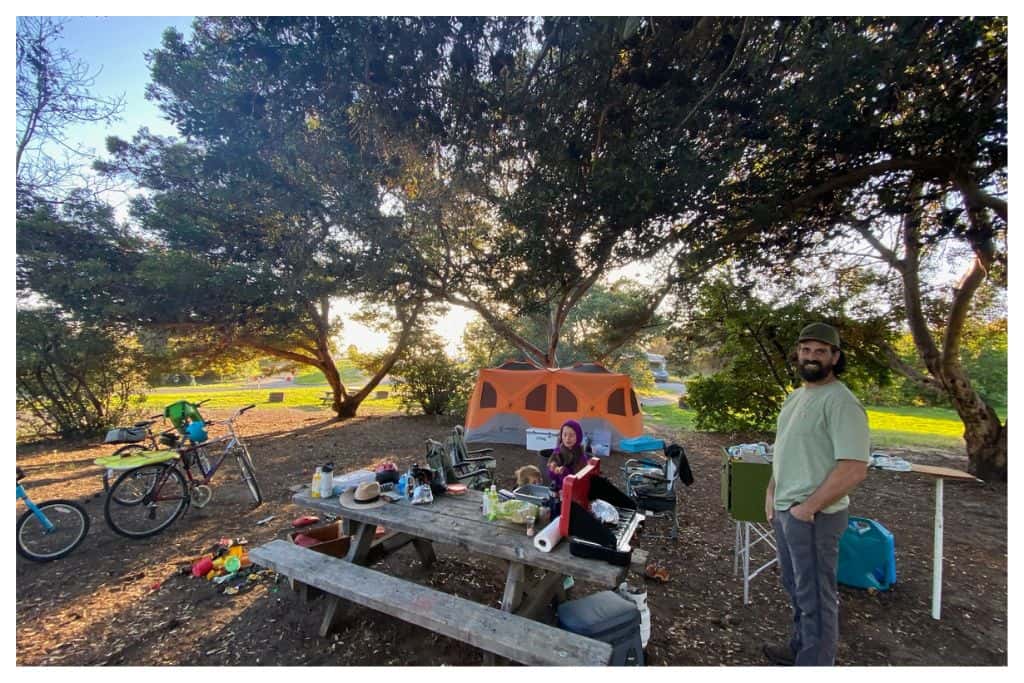
Primary Advantages: Connection to nature, cost-effective, go anywhere
Primary Drawback: Lack of comfort, limited protection in inclement weather (especially wind), and time to pack and unpack.
Trailer Camping
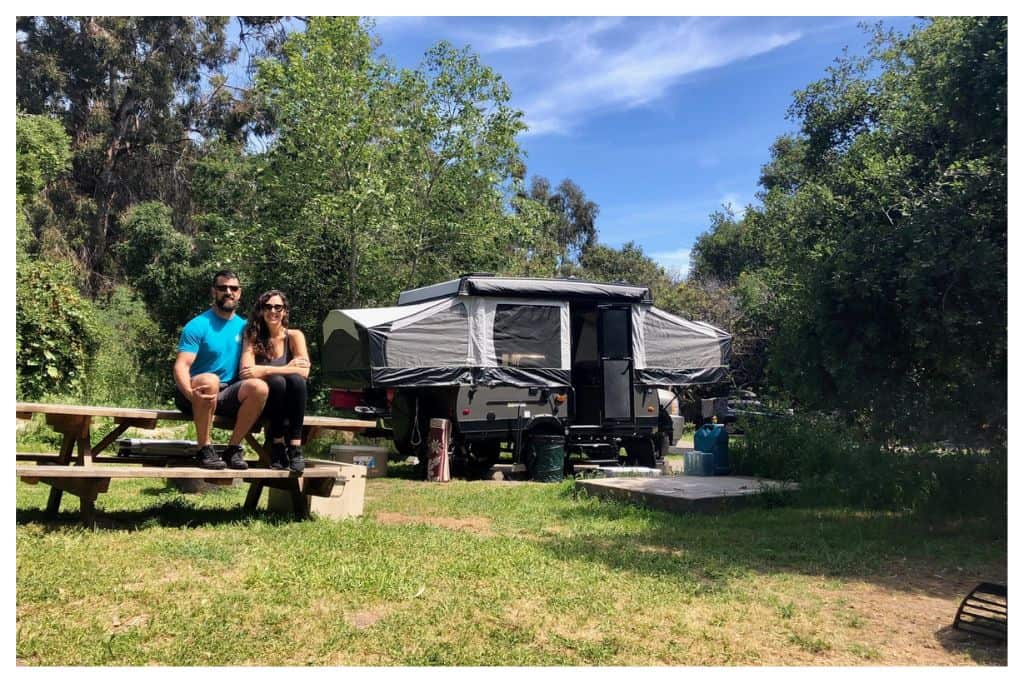
Primary Advantages: Increased Comfort (including in bad weather), keeping it loaded and ready to go, and increased storage.
Primary Drawbacks: Cost, maintenance, limited on where you can go.
My Choice
As I mentioned we’ve owned two trailers in the past. We started with a tent trailer and then tried a hard-side trailer. For various reasons, we decided to sell both and are back to camping in our tent.
I love our tent and it works well for our family. That being said, I do miss the comfort and convenience of a trailer and am always on the lookout for one that would suit our family’s needs and is in a price range we can afford.
So for now, tent camping takes the cake for our family. But as we get a little bit older, and our backs get a little bit achier, I could easily see getting back into a trailer.
Ultimately, whether you are in a tent or a trailer, the important thing is that you are getting out there with your family, having adventures, and making memories!
